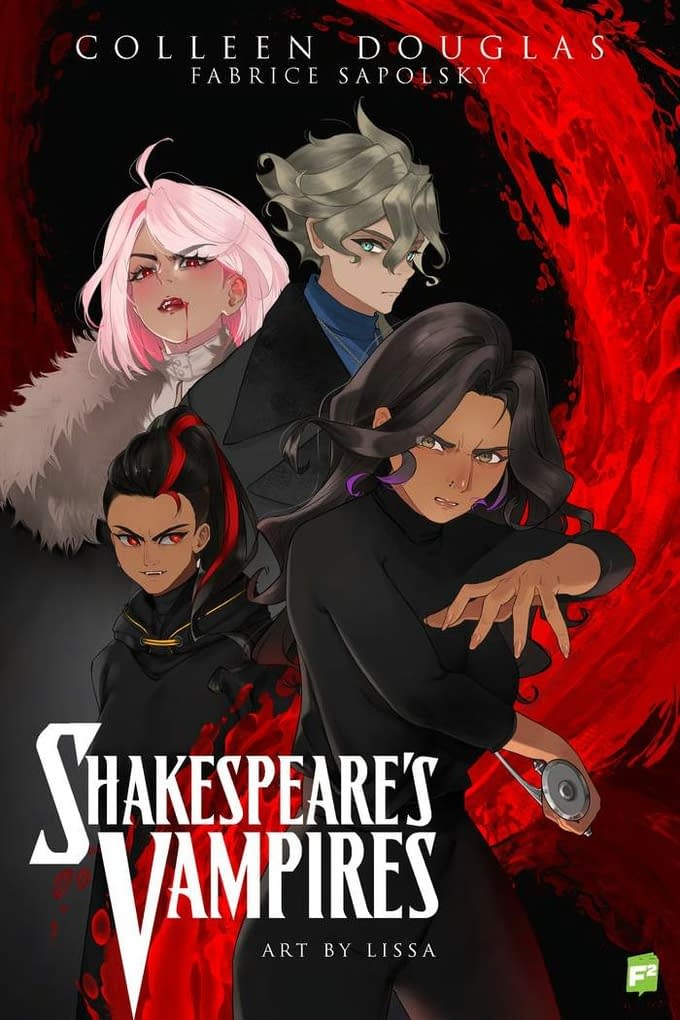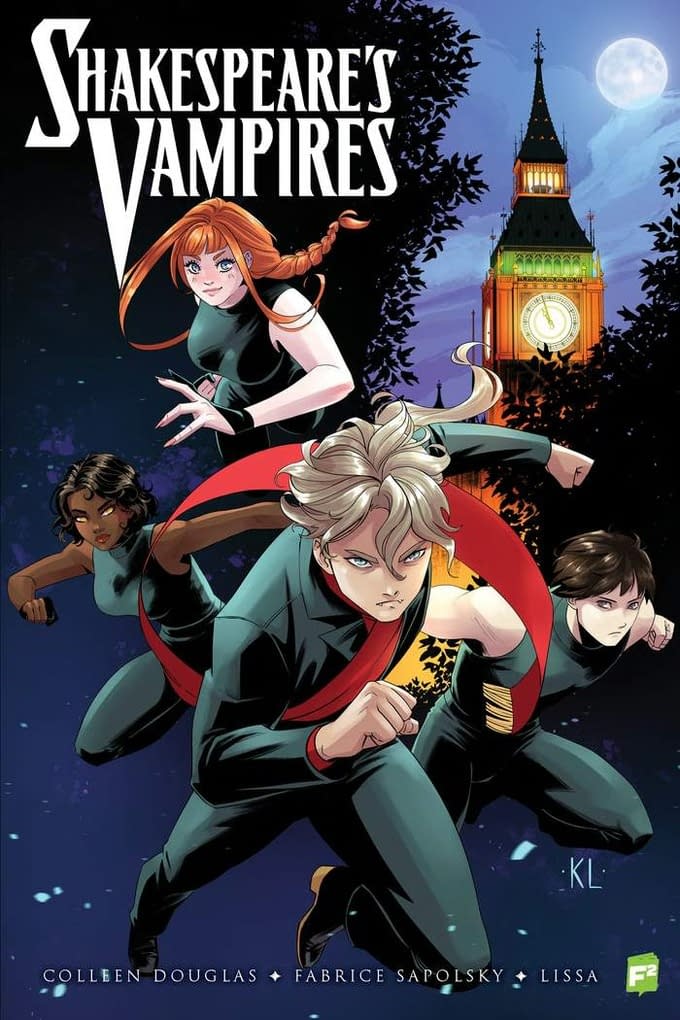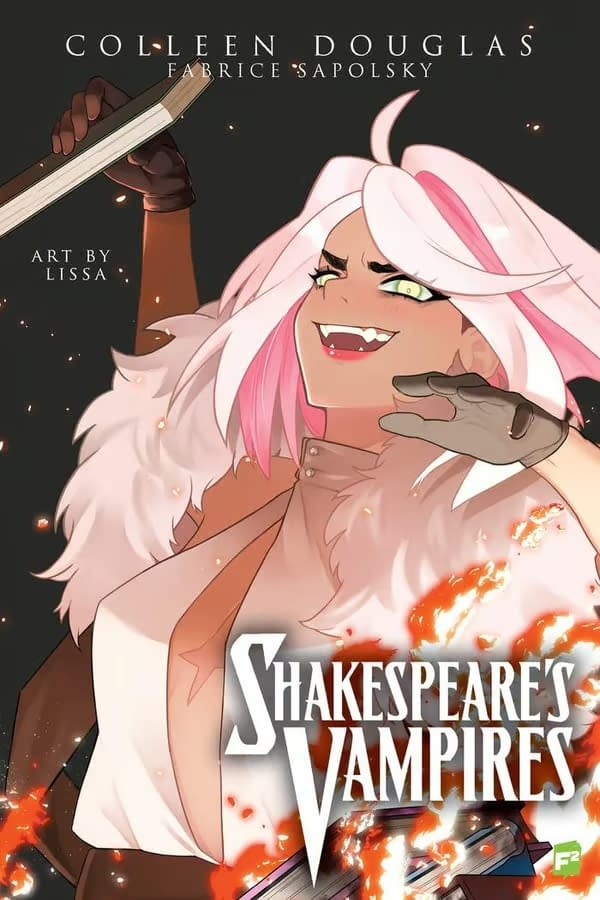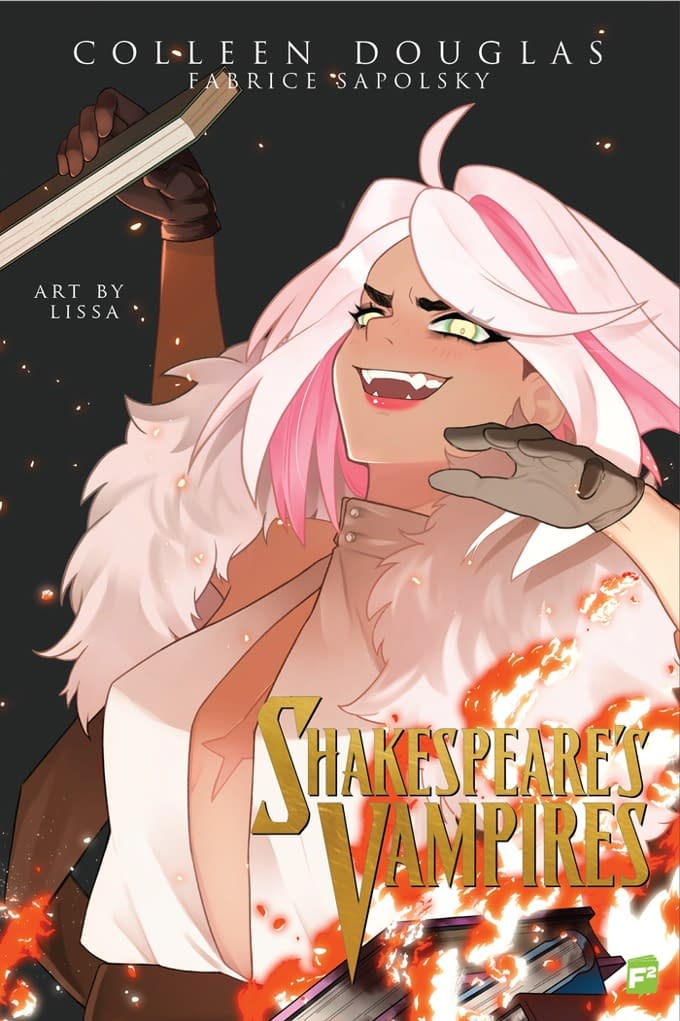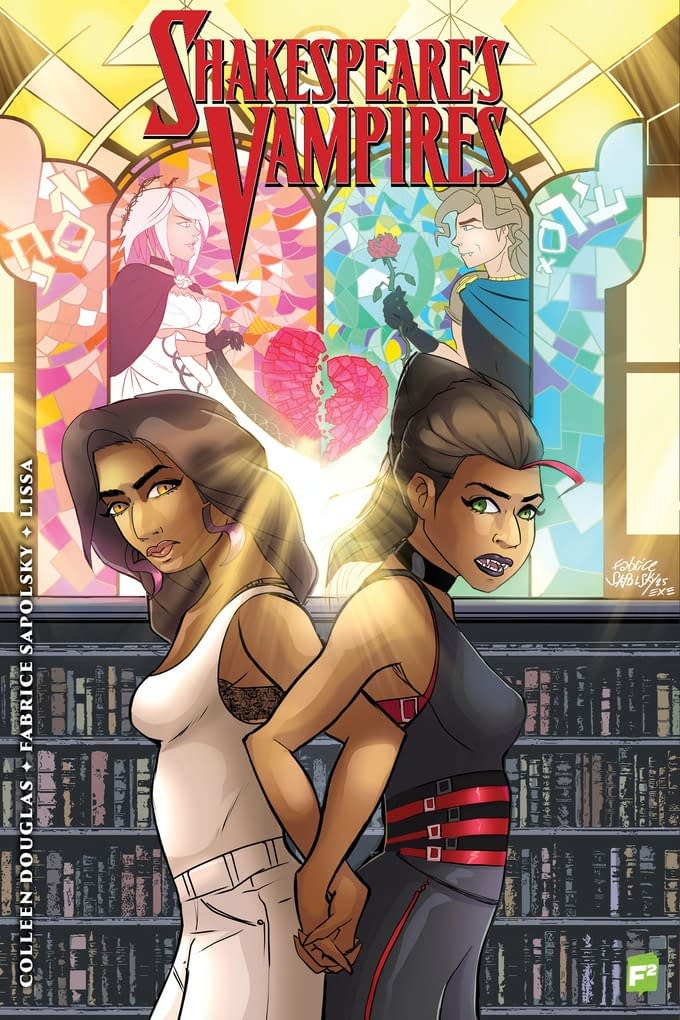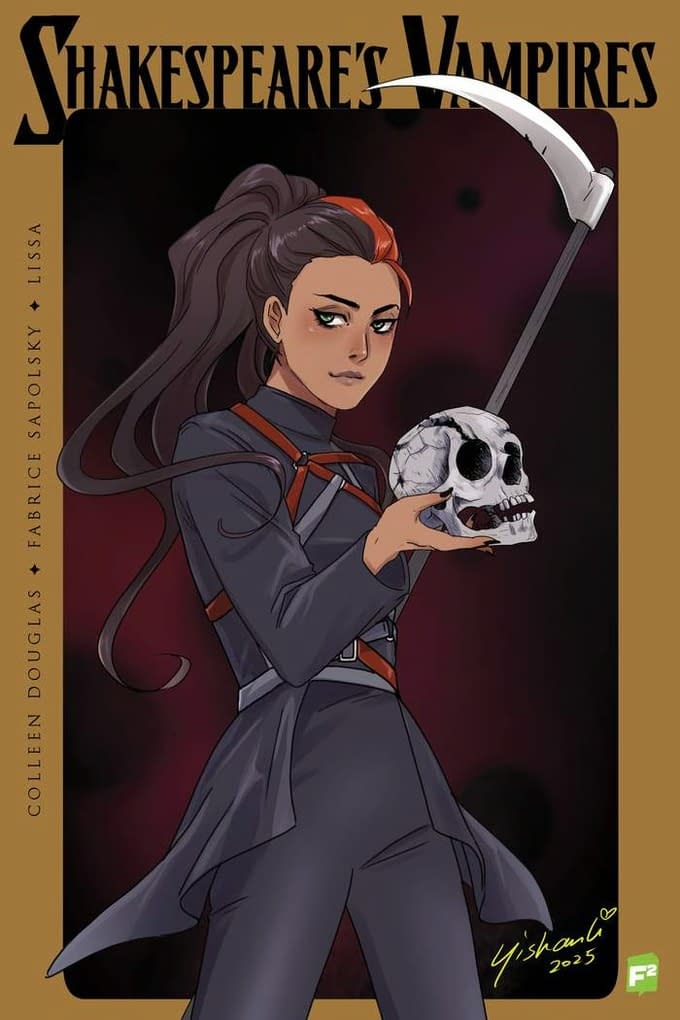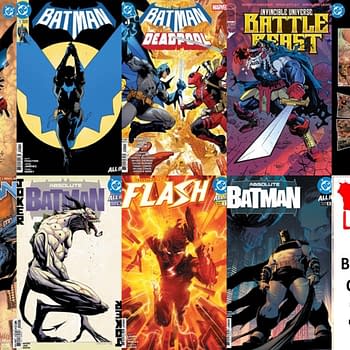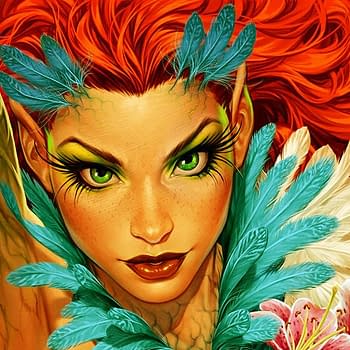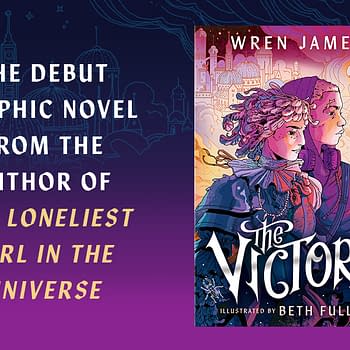Posted in: Comics, Current News | Tagged: colleen douglas, Shakespeare's Vampires
Dr Colleen Douglas Bringing Shakespeare's Vampires To Hastings
Dr Colleen Douglas is bringing Shakespeare's Vampires to Hastings Comic Con this weekend
Article Summary
- Dr Colleen Douglas debuts Shakespeare's Vampires at Hastings Comic Con after recent Glyph Award win
- Blending Caribbean folklore and horror, Douglas discusses her unique approach to supernatural comics
- Shakespeare's Vampires reimagines Romeo and Juliet as vampires hiding in London's Camden "catacombs"
- Insights on mythology, ancient coins, and bringing fresh twists to classic literature in graphic novels
Bleeding Cool favourite, Caribbean horror writer Dr Colleen Douglas, has a new book out for this weekend's Hastings Comic Con, Shakespeare's Vampires from FairSquare, but it comes in the wake of winning Glyph Awards and a new volume of her Shook Anthology coming out from Dark Horse Comics. And in the pub last week, I arranged for comic book creator David Baille to chat her up…
- Shakespeare's Vampires
- Shakespeare's Vampires
- Shakespeare's Vampires
- Shakespeare's Vampires
- Shakespeare's Vampires
- Shakespeare's Vampires
David Baille: Colleen! It's great to chat with you, and I can't wait for your upcoming appearance at the inaugural!) Hastings Comic Con this weekend. But first, can I ask, what is it like now that you are 'the award-winning Colleen Douglas'?
Colleen Douglas: It's great to be seen and recognised in the comics space for what you do, and in my case, after being in comics for a decade, it's especially grand.
David Baille: I adored your graphic novel Silk Cotton (with art by the amazing Jesus Gan!). It draws deeply from Caribbean mythology. What inspired you to bring this amazing folklore into the comics medium?
Colleen Douglas: I suppose the age-old adage applies to Silk Cotton, and that is "make the comics you want to see." There were no books on Caribbean Supernaturals (Anansi is not from the Caribbean; his heritage is West African, and those stories came with the transatlantic slave trade). I wanted to make a unique book that was special to me and stemmed from my childhood.
David Baille: A few years ago, I wrote a series based on Scottish mythology and found myself having to invent way more than I had planned to fill story gaps. Did you have the same experience?
Colleen Douglas: In my case, it is the exact opposite; it's a matter of being discerning with what to leave out of the stories so as not to entirely mortify an emerging audience.
David Baille: Oh wow – can you give us an example of something you left out? I'm totally intrigued!
Colleen Douglas: One of the supernaturals I left out, really because the story did not require it and is quite a head turner, is called a DOUEN (pronounced like dwen, rhymes with Gwen), a character of folklore best known for having feet that face backwards. They are also described as having no distinguishable facial features except for a mouth, often disguised by large floppy straw hats. Douens are said to be children who died without having been baptised and so are forced to roam the earth forever. They live in forests, are mischievous and playful, and invite live children to play with them. These children follow the douens into the forest and get lost, because of the douens' backwards-facing feet, it is difficult to track them and the children they kidnap. Another part of the lore about douens is that you should never shout a child's name at night outdoors. If you do, a douen might hear the name and then call the child in a parent's voice, thus luring them away into the forest.
David Baille: Your stories often blend horror, fantasy, and science fiction. What draws you to these genres, and which authors or comics have most influenced your work?
Colleen Douglas: I have always been attracted to atmospheric horror since I was a kid, from movies to books, King, Barker, Lumley, Weird Tales and Amazing Stories, A Basket Full of Heads, Bitter Root and Box of Bones. It's the inexorable pull to that thing shape shape-shifting in the corner of your eye, that you can't quite perceive, but you just know it's moving closer as you turn away. You say goodnight to your friend in their bed and then pass them in the bathroom, brushing their teeth on the way to your room.
David Baille: Your CV is full of intriguing nuggets, but I was particularly drawn to a mention of you having a PhD in Ancient Monetary Systems! That sounds fascinating – can you tell me more about that? And how has this academic background influenced any of your storytelling?
Colleen Douglas: It's just about the first type of currency exchange, bartering, followed by coinage and mixtures, including chattel. The first coin was from the Kingdom of Lydia and made of electrum alloy stamped on both sides to denote silver and gold, aka siglos and darics, respectively. My niche area is particularly the Byzantine coins era, and those are mainly gold solidus with the conob marker, which means it was struck in a Constantinople mint and is obryzum (1/72 of a pound of pure gold). The 72 is a part of the monetary foot used for the solid and comes from the Greek numbering system. The upshot of knowing this is you become an obsessive research nut when you write comics, and if you're me, you become weirdly unique with the content choice of your stories!
David Baille: You've worked as both a writer and an editor for several publishers, including Dark Horse. How does your editorial experience influence your writing process and storytelling style?
Colleen Douglas: The way I write creatively really does not reflect my editorial style. I am pretty structured and minimalist with panel layouts, and I don't tend to micro-manage, as I like the creative team I work with to have some input of their own. I'm much more flexible with editorial advice; it probably comes from the idea of wanting to help other creators get the best possible work before the eyes of their readers.
David Baille: Is that what you look for in an editor, yourself?
Colleen Douglas: Yes, undoubtedly, a good editor is worth their weight in gold, and a great one will always put the creator first and, where necessary, tell you the naked truth. To me, having such a person in your corner is invaluable and can only improve your comics skills.
David Baille: With "Shakespeare's Vampires", reimagining classic literature in a supernatural context, what attracts you to remixing established stories, and what challenges do you face in making them feel fresh and relevant?
Colleen Douglas: I love a good remix, I like to challenge the established norm and bring new perspectives to my work, and I think reimaginings are always fascinating when recontextualised. For me, especially, the challenge with Shakespeare's Vampires was about adapting certain devices from the original play to fit the new storyline in a real way that would make the reader interested enough to consider the concept a possibility. Like Romeo and Juliet being vampires. The natural question is, how did this happen? I used the existing device of Friar Laurence's medicinal knowledge to bridge that idea. I set the story in London, specifically Camden Town. There is a pretty rich history in that area and a trendy modern-day contrast, plus there are catacombs, which are perfect for vampires.
David Baille: Wait. Camden has catacombs? How come I didn't know that?! Have you been down there?
Colleen Douglas: Muhahaha! Yes, there are "catacombs" in Camden, though they are not truly so, as they were never used as repositories for bodies like those in Paris, but were rather underground passageways and engine vaults created for Horses and Pit Ponies by Robert Stephenson. It ran from the Roundhouse to Regents Canal, where an underground "pool" was made to float heavy timber and metal for the tracks on pontoons. The area acted as a safe walkway for the horses working in the station in the 19th century. Underground wheels and pulleys housed in engine vaults would also power the tracks, helping to pull heavy trains from Euston up to Camden Town by rope. Hence, the reason is that when you visit Camden Market, you can see an area called "The Stables". These days, it's closed to the public, but it has been known to serve as a storage space for whiskey, wine and gin!
David Baille: What will you have with you, and what can fans expect when they meet you this weekend at Hastings Comic Con?
Colleen Douglas: I will certainly have Silk Cotton and, of course, Shakespeare's Vampires along with my first comic Titan among other goodies. I am on a panel or two, so who knows, there might be a chance to hear me read an excerpt, you'll just have to come along and see!


